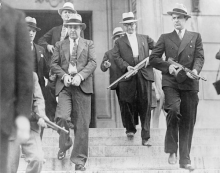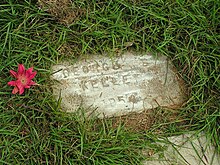Machine Gun Kelly Whats My Age Again
| Machine Gun Kelly | |
|---|---|
 Mugshot of Kelly | |
| Born | George Kelly Barnes (1895-07-18)July xviii, 1895 Memphis, Tennessee, U.S. |
| Died | July 18, 1954(1954-07-18) (aged 59) Leavenworth Penitentiary, Kansas, U.Due south. |
| Other names | Machine Gun Kelly, Popular Gun Kelly |
| Education | Mississippi Country University |
| Occupation | Gangster, bootlegger, man of affairs |
| Spouse(s) | Geneva Ramsey (yard. 1916; div. 1926) Kathryn Kelly (m. 1930) |
George Kelly Barnes (July eighteen, 1895 – July 18, 1954),[one] better known by his pseudonym "Machine Gun Kelly", was an American gangster from Memphis, Tennessee, active during the Prohibition era. His nickname came from his favorite weapon, a Thompson submachine gun. He is best known for the kidnapping of oil tycoon and man of affairs Charles F. Urschel in July 1933, from which he and his gang collected a $200,000 ransom (around $4.two one thousand thousand adapted for aggrandizement).[2] Urschel had collected and left considerable evidence that assisted the subsequent FBI investigation, which eventually led to Kelly'southward abort in Memphis, Tennessee, on September 26, 1933.[i] His crimes also included bootlegging and armed robbery.
Early life [edit]
Kelly's first sign of problem came when he enrolled in Mississippi Land University to study agronomics in 1917. From the start, Kelly was considered a poor student with his highest class (a C plus) awarded for good physical hygiene. He was constantly in trouble with the faculty and spent much of his bookish career attempting to piece of work off the demerits he had earned. It was during this time that Kelly met a young woman by the name of Geneva Ramsey. Kelly speedily barbarous in love with Geneva and made an abrupt decision to quit school and marry.[1]
Career [edit]
During the Prohibition era of the 1920s and 1930s, Kelly worked as a bootlegger for himself besides as a colleague.[3] After a short time, and several run-ins with the local Memphis police force, he decided to leave town and head westward with his girlfriend. To protect his family and to escape police force enforcement officers, he changed his name to George R. Kelly.[4] He continued to commit smaller crimes and bootlegging. He was arrested in Tulsa, Oklahoma, in 1928, for smuggling liquor onto an Indian Reservation, and sentenced to three years at Leavenworth Penitentiary, Kansas, beginning February xi, 1928. He was reportedly a model inmate and was released early. Shortly thereafter, Kelly married Kathryn Thorne, an experienced criminal who purchased Kelly'south first machine gun and insisted – despite his lack of interest in weapons – on his performing target practice in the countryside, and went to great lengths to familiarize his name inside secret crime circles.[5]


Kathryn and George Kelly receive life sentences for the Urschel kidnapping, Oct 12, 1933
Kelly'southward last criminal activity – the July 1933 kidnapping of wealthy Oklahoma City resident Charles F. Urschel and his friend Walter R. Jarrett – would become his undoing. The Kellys demanded a bribe of $200,000 ($4.2 million today), and held Urschel at the farm of Kathryn'southward mother and pace-begetter.[6] Urschel, having been blindfolded, made annotation of evidence of his feel, including remembering background sounds, counting footsteps and leaving fingerprints on surfaces in reach. This proved invaluable for the FBI in its investigation, as agents concluded that Urschel had been held in Paradise, Texas, based on sounds that Urschel remembered hearing while he was being held hostage.

Kelly'due south hideout at 1408 Rayner Street in Memphis, Tennessee (2010)
An investigation conducted in Memphis disclosed that the Kellys were living at the residence of J. C. Tichenor. Special agents from Birmingham, Alabama, were immediately dispatched to Memphis, where, in the early morning time hours of September 26, 1933, a raid was conducted. George and Kathryn Kelly were taken into custody by FBI agents and Memphis police. It is ofttimes reported that Kelly was defenseless without a weapon and allegedly shouted, "Don't shoot, G-Men! Don't shoot, G-Men!" as he surrendered to FBI agents. This version of events appears to be a media myth created months after the arrest. Some other version of the raid alleged Kelly had a pistol in his hand, but with a shotgun aimed at his heart he surrendered mumbling something along the lines of "I've been expecting you." Nevertheless, the FBI's earliest account of the upshot was written betwixt three and v days after Kelly's arrest and states: "Agent Rorer saw that Kelly…had proceeded into the front chamber and was in a corner with his hands raised. He was covered past [Memphis Police] Sergeant [name withheld]." with Kelly not reported to have spoken at all.[7] [eight] [9]
The arrest of the Kellys was overshadowed by the escape of ten inmates, including all of the members of the time to come Dillinger gang, from the penitentiary in Michigan City, Indiana, that aforementioned night.[x]
On October 12, 1933, George and Kathryn Kelly were convicted and sentenced to life imprisonment. The trial was held at the Post Part, Courthouse, and Federal Office Building in Oklahoma City.
An investigation in Coleman, Texas, disclosed that the Kellys had been housed and protected past Cassey Earl Coleman and Will Casey, and that Coleman had assisted George Kelly in storing $73,250 of the Urschel ransom money on his ranch. This coin was located by Bureau agents in the early morning hours of September 27 in a cotton fiber patch on Coleman'due south ranch. They were both indicted in Dallas, Texas, on October iv, 1933, charged with harboring a fugitive and conspiracy, and on October 17, 1933, Coleman, after entering a plea of guilty, was sentenced to serve i twelvemonth and one day, and Casey, after trial and conviction, was sentenced to serve ii years in the The states Penitentiary at Leavenworth, Kansas.[11]
The kidnapping of Urschel and the two trials that resulted were historic in several ways. They were:
- the first federal criminal trials in the The states in which moving-picture show cameras were immune;
- the first kidnapping trials after the passage of the Lindbergh Law, which made kidnapping a federal offense;
- the outset major instance solved by J. Edgar Hoover'due south FBI; and
- the showtime prosecution in which defendants were transported by aeroplane.
Death [edit]

His gravestone, marked "George B. Kelley"
Machine Gun Kelly spent his remaining 21 years in prison. During his time at Alcatraz, he got the nickname "Popular Gun Kelly." Co-ordinate to fellow inmate Dale Stamphill, the nickname originated considering, "He told big fish stories. The cons called him 'Pop Gun Kelly' after cork guns that were popular with kids...the guys didn't accept him seriously...." This may have stemmed from the fact that, in addition to his exaggerated tall tales, Kelly was a model prisoner and did not act similar the cruel gangster his wife, the media, and FBI had made him out to be.[12] [13] [14] [15] He spent 17 years on Alcatraz as inmate number 117, working in the prison industries, continuing to boast and exaggerate his past escapades to other inmates, and was quietly transferred dorsum to Leavenworth in 1951. He died of a heart attack at Leavenworth on July 18, 1954, his 59th birthday, and was buried at Cottondale Texas Cemetery in Kathryn Kelly'southward stepfather'south family plot[16] [17] with a pocket-size headstone marked "George B. Kelley 1954".[eighteen] Kathryn Kelly was released from prison house in 1958 and lived in relative anonymity in Oklahoma under the assumed name "Lera Cleo Kelly" until her death in 1985 at the age of 81.[19]
In pop culture [edit]
Machine Gun Kelly and his crimes are portrayed in films such as Machine-Gun Kelly (1958), The FBI Story (1959) and Melvin Purvis: Thou-Man (1974).
Criminal offense novelist Ace Atkins' 2010 book Infamous is based on the Urschel kidnapping and on George and Kathryn Kelly. Kelly is (along with Pretty Boy Floyd and Baby Face Nelson) one of the main characters of the comic book series Pretty, Baby, Machine.
George and Kathryn Kelly were the inspiration for "Machine Gun Kelly" (1970), a song written by Danny "Kootch" Kortchmar and recorded by James Taylor on his 1971 album Mud Slide Slim and the Blue Horizon.
Machine Gun Kelly is the stage name for American musician Colson Baker, from Houston, Texas.
Kelly was an inspiration to the pop UK punk band, The Angelic Upstarts, for their track "Auto Gun Kelly" written by Thomas 'Mensi' Mensforth.
References [edit]
- ^ a b c "George 'Machine Gun' Kelly". Alcatraz History.com. 2015. Retrieved Baronial 16, 2015.
- ^ O'Dell, Larry. "Urschel Kidnapping". Oklahoma Historical Club. Encyclopedia of Oklahoma History and Culture. Archived from the original on Dec 28, 2014. Retrieved May xi, 2012.
- ^ Finger, Michael (September 7, 2005). "Public Enemy Number One: The existent story of Car Gun Kelly, the Memphis boy who grew upward to become the nigh wanted human in America". Memphis Flyer.
- ^ "Car Gun Kelly". Family unit Tree Genealogy. Retrieved July thirteen, 2009.
- ^ 200 Texas Outlaws and Lawmen, 1835-1935, Laurence J. Yadon, Dan Anderson, ed. Robert Barr Smith, Pelican Publishing Visitor, 2008, p. 144
- ^ "Kathryn Kelly – Crime Museum". Crime Museum . Retrieved May eighteen, 2018.
- ^ "FBI 100 - Auto Gun Kelly". FBI.
- ^ Finger, Michael. "Public Enemy Number One". Memphis Flyer.
- ^ ""Machine Gun" Kelly and the Fable of the Thou-Men". FBI.
- ^ Fee, Christopher R.; Webb, Jeffrey B. (August 31, 2016). American Myths, Legends, and Alpine Tales: An Encyclopedia of American Folklore (3 Volumes). ABC-CLIO. p. 310. ISBN978-1-61069-568-8.
- ^ "FBI 100. The legend of 'Machine Gun Kelly'". FBI. September 26, 2008. Retrieved May 6, 2009.
- ^ "Machine Gun Kelly and His Lost Years on Alcatraz". July 16, 2019.
- ^ "Car Gun Kelly captured in Memphis". historic-memphis.com.
- ^ "George "Machine Gun" Kelly". www.alcatrazhistory.com.
- ^ Finger, Michael (July 10, 2017). "The Existent Story of Machine Gun Kelly". Memphis magazine.
- ^ The Paradise Historical Society, Car Gun Kelly URL= http://world wide web.paradisehistoricalsociety.org/machine-gun-kelly Date accessed= October 18, 2018
- ^ "Machinegun' Kelly's Wife Lost Chance for Freedom Thwarted Deal Sealed Convictions | News OK". February eighteen, 2017. Archived from the original on February 18, 2017. Retrieved May 18, 2018.
- ^ "George "Motorcar Gun" Kelly". Wise County Sheriff'due south Department. 2003. Archived from the original on September 27, 2006. Retrieved May six, 2009.
- ^ "Kathryn Kelly".
Further reading [edit]
- Atkins, Ace (2010). Infamous . M.P. Putnam's Sons. ISBN9780399156304.
- Hamilton, Stanley (2003). Machine Gun Kelly'southward Last Stand. Academy Press of Kansas. ISBN978-0-7006-1247-v.
- Kirkpatrick, E.E. (1934). Crimes' Paradise (1st ed.). San Antonio, Texas: The Naylor Company.
- Urschel, Joe (2016). The Yr of Fearfulness:Automobile Gun Kelly and the Manhunt That Changed the Nation. Minotaur Books. ISBN978-one-250-10548-6.
External links [edit]
- Automobile Gun Kelly at Notice a Grave
- FBI file on George "Machine Gun Kelly" Barnes
Source: https://en.wikipedia.org/wiki/Machine_Gun_Kelly
0 Response to "Machine Gun Kelly Whats My Age Again"
Post a Comment